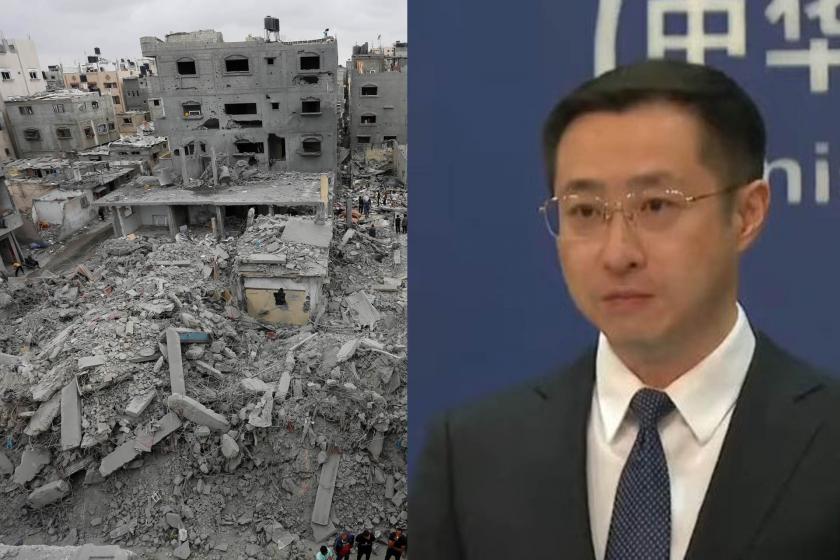Palestinian Factions Fatah and Hamas Aim for Reconciliation in Beijing Talks
In a potentially historic series of meetings in Beijing, rival Palestinian factions Fatah and Hamas have agreed to pursue unity and reconciliation, sparking hope for internal peace.
Published May 01, 2024 - 00:05am

Image recovered from evrensel.net
Recent talks in Beijing marked a significant step toward reconciliation between the Palestinian factions, Fatah and Hamas, as officials from both sides expressed a clear intent to unite for Palestinian solidarity. Invited by China, the representatives engaged in what Chinese Foreign Ministry spokesperson Lin Jian described as 'deeper and frank dialogue' to advance Palestinian internal reconciliation. The discussions have been regarded as constructive, with confirmed progress toward continuing dialogue aimed at achieving Palestinian unity at the earliest opportunity.
The factions, which have been at odds since Hamas seized control of the Gaza Strip from Fatah in 2007 after a brief conflict, found common ground in Beijing against the backdrop of a prolonged Israeli-Palestinian conflict. The Chinese spokesperson reiterated both groups' gratitude towards Beijing for its efforts to promote Palestinian internal unity and confirmed their agreement on further dialogue. With China traditionally supporting the creation of an independent Palestinian state and advocating for a two-state solution, Beijing maintains its relationships with both Fatah and Hamas, pushing for a peaceful resolution to the long-standing division.
This series of talks has reignited previous attempts at reconciliation between the two largest Palestinian organizations, with prior discussions yielding little tangible progress. Despite a history of rivalry and conflict, including a violent takeover of the Gaza Strip by Hamas and consequent governance responsibilities for the region's civilian population, the current negotiations in China could pave the way for a united Palestinian leadership and potentially significant political shifts in the region.
The implications of these talks are profound, especially when considering the long-term goals of achieving a two-state solution, which also meets international demands for peace in the Middle East. However, the path ahead remains complex as multiple interests intersect, including conflicting perspectives on Israel's role and the recognition of a Palestinian state within pre-1967 borders. Nevertheless, the commitment to dialogue and reconciliation by both Fatah and Hamas initiates a hopeful discourse towards ending internal divisions and working towards a unified Palestinian voice in future peace negotiations.
The success of the recent discussions in Beijing may signal a watershed moment for Palestinian politics, as the Fatah and Hamas factions edge closer to ending a decade-long feud. The unity talks have sparked cautious optimism among international observers, who note that the reconciliation could fortify the Palestinians' position in dealing with Israel and the broader international community. Both sides have expressed a desire to form a unity government that would oversee elections in the Palestinian territories, a step that could revive diplomacy and renew efforts towards statehood.
Key issues remain unresolved, however, including the governance of Gaza, the handling of security arrangements, and the political integration of the two factions' various institutional frameworks. Additionally, the factions must address ideological differences and mutual distrust, which have impeded reconciliation efforts in the past. Hamas has faced international scrutiny for its militant resistance to Israeli occupation, which contrasts with Fatah's more moderate stance and its leadership in the Palestinian Authority.
The potential of a unified Palestinian leadership represents more than internal stabilization—it also poses potential changes to regional dynamics. A united Palestinian front could alter the balance of power in negotiations with Israel, potentially increasing the pressure on the Israeli government to make concessions. It could also lead to reinvigorated involvement from other regional actors seeking to wield influence, such as Iran, Qatar, Egypt, and Turkey, each with its strategic interests in supporting different Palestinian factions.
A unified Palestinian voice would likely echo louder on the international stage, possibly facilitating re-engagement with the United States and European nations following years of stagnated peace talks. The prioritization of Palestinian unity by China also suggests a shift in international diplomacy, with Beijing positioning itself as a mediator capable of influencing the peace process – a role traditionally dominated by the United States. The Chinese government’s investment in Middle East diplomacy fits into a larger pattern of expanding its global influence through conflict mediation.
Despite the renewed focus on unity, skepticism still lingers about the tangible outcomes of these talks. Past attempts at bridging the gap between Fatah and Hamas have often fallen short. The 2011 Cairo Agreement and the 2014 Gaza Agreement, for instance, were heralded as breakthrough moments, yet implementation stalled amid political and logistical disagreements. Observers caution that even with the best intentions, actual implementation of an agreement will require overcoming substantial hurdles.
Moreover, the situation within the Palestinian territories continues to be marked by humanitarian concerns. Gaza, in particular, has been dealing with severe economic and infrastructure challenges exacerbated by blockades and frequent hostilities. Fatah and Hamas reconciling could unlock opportunities for rebuilding and international aid, which may improve living conditions for the Palestinian population. The reconciliation process could also potentially lead to a more unified approach to vaccination efforts and healthcare provision amidst the COVID-19 pandemic.
Ultimately, the reconciliation talks in Beijing offer a glimmer of hope for ending internal Palestinian discord and revitalizing efforts toward an independent state. The positive indications from these sessions illustrate a willingness on all sides to move the needle, but the true test will be in the coming months as Palestinians attempt to translate dialogue into concrete actions. It remains to be seen whether this newfound spirit of cooperation will lead to significant political change or if it will be another chapter in the long history of unresolved Palestinian reconciliation efforts.







